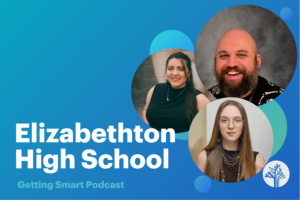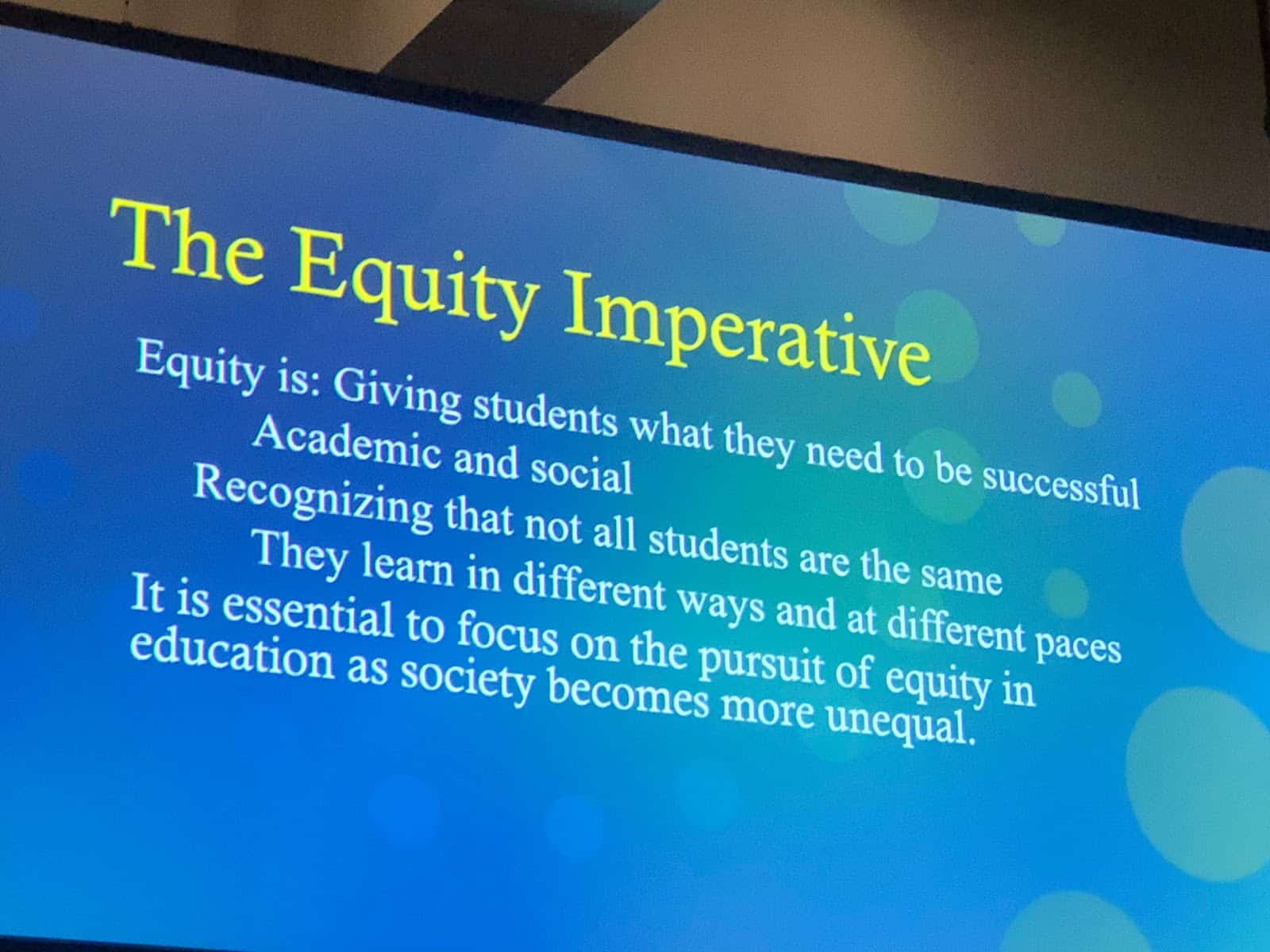Shining a Light on the Future of Learning at Aurora Institute

And it’s a wrap. With another iNACOL (Now Aurora Institute) Symposium in the books, our team collaboratively reflected on our learnings, insights, and reflections as we continue our journey to “shining a light on the future of learning.” With an opening keynote that concluded with an exciting rebrand announcement, the 2019 Aurora Institute Symposium was underway.
Behind the facelift, attendees were greeted the same quality programming expected from the symposium, along with many of the ideas and people that have come to make the Symposium a leading event for educators across the nation. We were specifically impressed with the increase in interactive, workshop style sessions that felt closer to the type of learning experiences we hope to make possible for all learners.
We were grateful to be able to attend for the eighth year in a row and continue learning with and supporting this great community. Among topics such as interoperability and competency, we noted the following five major themes.
Whole Child Development Should Be The New Norm
The opening keynote by Dr. Brooke Stafford-Brizard (@StaffordBrizard) of the Chan Zuckerberg Initiative focused on the need to develop students’ awareness (mindfulness), connection (relationships, empathy, gratitude), insight (knowledge of self), and purpose (international focus on how they can contribute in a way that’s meaningful to both themselves and the world around them).
Our learners are also our children. Their mental health matters. We must Maslow before we Blooms. Thank you @StaffordBrizard for helping reconnect our systemic supports to the whole child. #iNACOL19 pic.twitter.com/qdseA0S8rp
— Virgel Hammonds (@VirgelHammonds) October 28, 2019
Derek Wenmoth, Principal Consultant at CORE Education (@dwenmoth), reinforced this point in his own keynote when he argued that both human and student agency require developing an understanding of one’s self (how you learn, what motivates you, and what impacts your beliefs) and thinking about responsibility that you have to others and to your environment.
Jackie Statum Allen, Education Portfolio Director of the Bush Foundation (@Jacstat), drove this idea home by asking: “Did you love school? Did school love you?” Because, she argued, “A school that loves you is a school that sees you—all of you.”
Moving Toward Equity By Spreading Deeper Learning
Pedro Noguera, in his moving luncheon keynote, reminded us that problems with our system and our outcomes do not arise because of our students—it’s the way we treat them. “It’s our failure to create the conditions that allow kids to learn,” he said.
From there, Noguera went on to share his view that “equity is giving students what they need to be successful.” Our model too often causes kids to begin to hate learning, he argued, and this is usually the result of a focus on academics at the expense of passion and response to social-emotional needs. For students who have fallen behind, he argued, this approach serves only to further remove them from any desire to continue learning.
“We focus on the behavior, not the need—and when you focus on the behavior, you’ll never address the need,” he said.
"We've been using fear as a motivator for students when we should be using hope" @PedroANoguera #inacol19
— Caroline Vander Ark (@cvanderark) October 30, 2019
Noguera concluded his keynote by reminding us that to pursue equity, we must focus on access to deeper learning, and that access to high standards and challenging learning opportunities is an equity issue.
“Our kids will rise to the level of our expectations. The challenge is to get adults to believe our kids are capable of so much more.” @PedroANoguera
A truly inspecting and incredible keynote. Thank you, Pedro. #iNACOL19 #futureoflearning #innovation
— Getting Smart (@Getting_Smart) October 30, 2019
Measuring Deeper Learning For Consistent Quality
One theme discussed in numerous panels was how we can measure and track the types of deeper learning skills and experiences discussed by Noguera.
A session led by Two Rivers Public Charter Schools (@TwoRiversPCS) made the point that this type of assessment is all about giving students a chance to show their thinking, and that assessment of deeper learning should primarily be formative rather than summative.
When relating this idea to competency-based systems, Tom Gaffey (@Mr_Pedagogy), Chief Instructional Technologist of Building 21, pointed out that “a competency sits at a higher level than a standard—you might think of them as a cluster that is transferable across content areas. From there, you make indicators of what competency looks like, and from there you develop a continuum that can be used as a rubric.”
One of the most important things not just for competency-based learning models but for all schools, he argued, is to norm for subjectivity and variance among teachers. Teachers should go through a process where they individually rate a student’s performance based on the rubric, then debate within small groups to come to a shared understanding of the standards, which helps to shrink any variance in teacher judgments.
Start With Why To Bring People With You
Starting with “Why” is an idea we’ve all heard before, but there’s a reason for it’s staying power—it continues to impact a vast array of efforts in education.
For example, Shelli Kurth (@ShelliKai) and Nicole Assisi (@DocAssisi) of Thrive (@ThrivePS) believe that storytelling starts with “rooting in why” in order to connect emotionally with your audience.
It also continues to be an important reminder of what drives our students. As Noguera succinctly phrased it, “Teachers must know their students—what are their strengths and what motivates them.”
The team from Westminster Public Schools (@WPSNewsNow) drove this idea home in regards to system change. “Getting people to come along with overhauling master schedules and any other huge challenge is to start with why,” they advised.
Contribution Matters
One of the best ways to “start with why” is an idea that we’ve been speaking (and thinking) about a lot lately, and it was present throughout the Aurora Institute Symposium as well: contribution. When we give students a chance to contribute to the world around them by solving real-world problems, they develop new passions and deeper skills and knowledge.
"If our aim is to prepare students for the real world, we need to give them the real world every day." Competency-Based Education by Rose L. Colby #iNACOL19
— Ryan Gibson (@RyanGibsonEDU) October 30, 2019
This idea was a regular guest at the Symposium—whether it was Wenmoth’s reminder that the UN Sustainable Development Goals are a great way to increase the real-world relevance of projects, or one of the student voices sharing that “We want school to feel meaningful—to be able to bring things we love into school and connect school to what matters to us.”
Until Next Time Aurora
The Aurora Symposium remains, at its core, an important and valuable event that brings together a diverse group of educators and edleaders to move the needle forward for competency-based and personalized learning.
We must educate for both understanding and critical engagement, we must engage both the head and the heart by building relationships and trust with learners, and we must balance assessment with what really matters—learning.
Our team is already looking forward to the official second year of the Aurora Symposium. Save the date and we’ll see you in San Antonio, October 25-28, 2020.
For more, see:
- It’s a New Dawn as iNACOL Becomes Aurora Institute
- Podcast: Susan Patrick on Transforming Education Systems for Equitable High-Quality Learning
- Getting Smart Podcast | EdLeader Voices at the iNACOL Symposium
Stay in-the-know with all things edtech and innovations in learning by signing up to receive the weekly Smart Update. This post includes mentions of a Getting Smart partner. For a full list of partners, affiliate organizations and all other disclosures, please see our Partner page.







Jack
"We focus on the behavior, not the need—and when you focus on the behavior, you’ll never address the need... " speaks a truth that goes largely ignored.
Pedro is nothing short of amazing- glad everyone had a great time!
-Jack